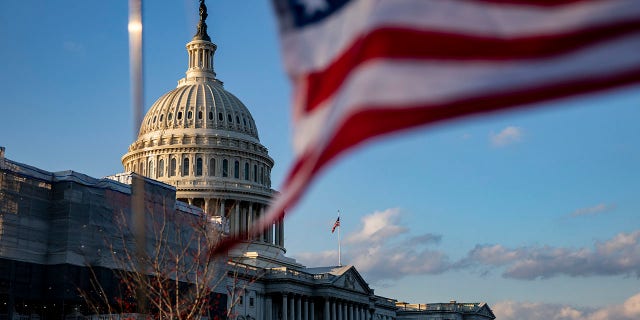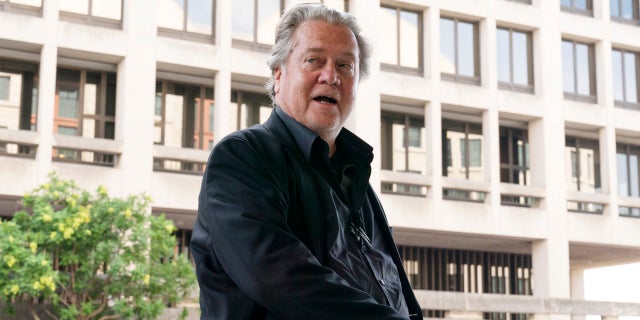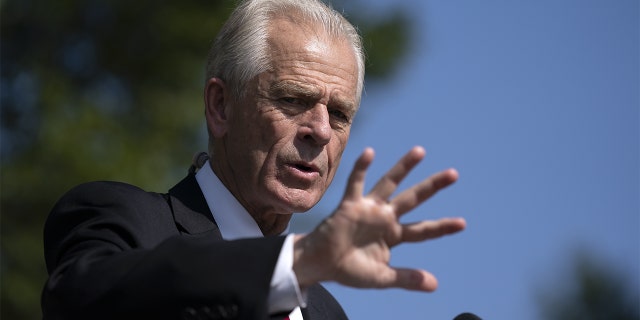Former President Trump apparently has a lot in common with late presidents John Quincy Adams, John Tyler and Harry Truman.
Congressional committees issued subpoenas to all of them to testify.
Such subpoenas for a former chief executive are about as rare as it gets on Capitol Hill.
That’s why the blockbuster subpoena for Mr. Trump by the panel investigating last year’s riot qualifies as this fall’s version of an “October surprise.”
SEN. PATRICK LEAHY TAKEN TO HOSPITAL IN WASHINGTON ‘AS A PRECAUTION’ AFTER NOT FEELING WELL
It’s impossible to determine whether the former president will appear. And there are questions about how serious the committee is in its quest to hear from Mr. Trump, especially since it issued the subpoena in the final moments of its final hearing.
Former President Trump speaks at Trump National Golf Club in Bedminster, N.J., July 7, 2021.
(AP Photo/Seth Wenig)
The subpoena may be a move by the committee to punctuate its work before the November election. A potential Republican majority could dissolve the committee.
“They simply don’t have the runway to get this to take off before the midterm elections,” said George Washington University law professor Jonathan Turley. “They waited until the very last minute, and they didn’t give themselves much time or room if the president challenges the subpoena.”
It’s anyone’s guess if the former president might appear. Colleague Brooke Singman reports that a source close to Mr. Trump says he would “love” to testify.
Former President Trump penned a hostile, meandering, 14-page letter to House Jan. 6 Committee Chairman Bennie Thompson, D-Miss., which shed little light on if he would testify. The rambling missive features a 93-word opening sentence. The treatise veers wildly into unproven conspiracy theories about the election.
“Despite very poor television ratings, the Unselect Committee has perpetuated a Show Trial the likes of which this Country has never seen before,” Mr. Trump charged.
NEW VIDEO SHOWS PELOSI THREATENED TO ‘PUNCH OUT’ TRUMP ON JAN. 6: ‘I’M GOING TO GO TO JAIL’
Despite the bluster, it’s impossible to predict what former President Trump could do. However, Turley says any indication that the former president might testify would leave “most of his legal counsel in tight fetal positions.”
It’s well known that serving as one of Mr. Trump’s attorneys is not a normal legal job.
“I mean the idea that the president would testify, with all of these legal proceedings going on and investigations, is enough to reduce most defense attorneys to tears,” said Turley.
But Congress has summoned former presidents before. The track record of cooperation is mixed.
The House Foreign Affairs Committee believed that Secretary of State Daniel Webster misused money for secret intelligence operations. So it subpoenaed Adams and Tyler to explain how their administrations dealt with such clandestine accounts. Both former presidents complied with the subpoenas.

The U.S. Capitol building in Washington, D.C.
(Samuel Corum/Getty Images)
The House Committee on Un-American Activities issued a subpoena for former President Harry Truman to testify about government officials suspected of communist links. Truman refused the subpoena, citing separation of powers. But the committee didn’t try to compel Truman to appear.
President Gerald Ford is the last executive in chief to testify to a congressional panel. Ford spoke to the House Judiciary Committee in March 1983 about the bicentennial of the Constitution. Truman appeared before the Senate Foreign Relations Committee in April 1955 about the United Nations Charter.
Even some sitting presidents have testified to Congress. President George Washington spoke to the entire Senate about Indian treaties in 1789. President Abraham Lincoln appeared before the House Judiciary Committee about a news leak in 1862. President Woodrow Wilson made his appeal for the League of Nations before the Senate Foreign Relations Committee in 1919. And, in 1974, Ford explained his pardon of former President Richard Nixon to the House Judiciary Committee.
So what happens next with former President Trump?
GOP QUESTIONS TRUMP SUBPOENA TIMING: ‘MADE-FOR-TV PROP’
Mr. Trump could potentially testify in a closed-door deposition. But don’t count on it with a media-hungry former president despite his suggestion in the letter to Thompson that the committee’s hearings suffer from “very poor television ratings.”
The eyeballs are always paramount to former President Trump. A number of former Trump advisers have appeared for closed-door depositions and invoked the Fifth Amendment. Those include lawyer John Eastman, former Justice Department official Jeffrey Clark and adviser Roger Stone.

Former White House strategist Steve Bannon arrives at federal court in Washington July 21, 2022.
(AP Photo/Jose Luis Magana)
Despite the bravado, it’s doubtful Mr. Trump would ever testify before the House Jan. 6 committee. The biggest obstacle is the clock and limited time before this Congress expires on the morning of Jan. 3 next year.
As much as the committee may want to hear from the former president, you may be shocked to learn that politics are afoot.
The committee likely anticipates noncompliance by former President Trump. So the next step for the panel is to send the issue before the full House to vote to hold Mr. Trump in contempt of Congress. A contempt of Congress citation by the House means it can refer the former president to the Justice Department for possible prosecution after failing to comply with a subpoena.
It’s then up to Attorney General Merrick Garland to possibly prosecute the former president under an 1857 statute. Failing to comply with a congressional subpoena could earn someone a month to a year in prison.
The Democratic-controlled House has moved against a number of Trump administration officials as part of the Jan. 6 committee’s investigation into the Capitol incursion. Former Trump aide Steve Bannon rejected the committee’s subpoena out of hand. The House voted to hold him in contempt and sent a criminal referral to the Department of Justice. The DOJ prosecuted Bannon, and a jury convicted him in July. Bannon faces sentencing later this month.
The House also cited former Trump trade aide Peter Navarro in contempt of Congress. Navarro tried to claim executive privilege. Navarro’s trial begins next month.

Peter Navarro, director of the National Trade Council, speaks to members of the media outside the White House in Washington, D.C., Aug. 28, 2020.
(Stefani Reynolds/Sipa/Bloomberg via Getty Images)
The House also voted to hold former White House chief of staff Mark Meadows and Trump White House communications aide Dan Scavino in contempt of Congress. But DOJ never prosecuted either.
Congress also has at its disposal a peculiar option that it hasn’t deployed in nearly a century. It’s a parliamentary mechanism called “inherent contempt.”
CLICK HERE TO GET THE FOX NEWS APP
In the late 18th and early 19th centuries, Congress sometimes moved to hold persons in contempt and then arrested or held those people on its own. Congress is granted certain powers under Article I of the Constitution.
So why mess around with the executive and judiciary branches? Congress last pulled the inherent contempt lever in the 1930s as it probed an air mail scandal. An uncooperative official from the Commerce Department found himself “arrested” and “held” by Congress. But lawmakers didn’t lock him up in the basement of the Capitol, but, instead, at the posh Willard Hotel in downtown Washington, D.C.
If lawmakers want to move against former President Trump, time is important. Even if Congress votes to hold him in contempt, it’s possible a GOP-controlled House could move to rescind that citation. That would undercut any possibility for DOJ to prosecute Mr. Trump for not complying with the subpoena.
 Milon Shil All About Entertainment, Lander World
Milon Shil All About Entertainment, Lander World